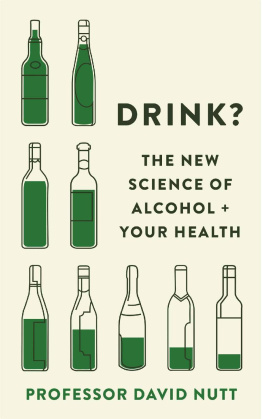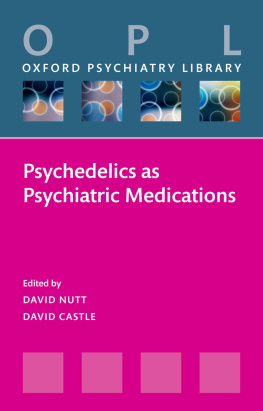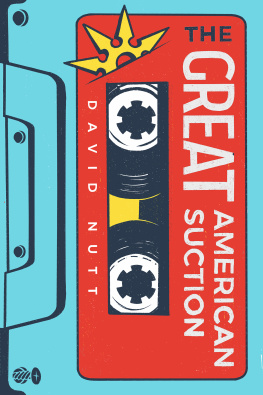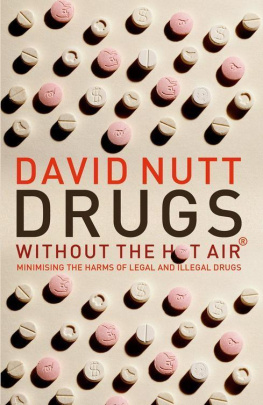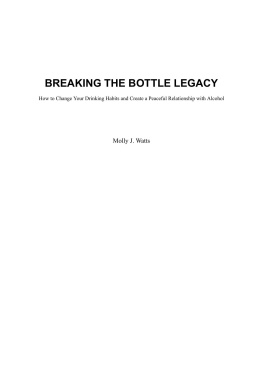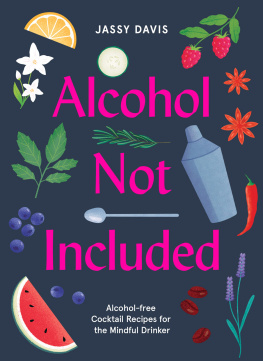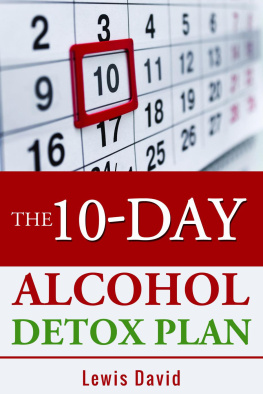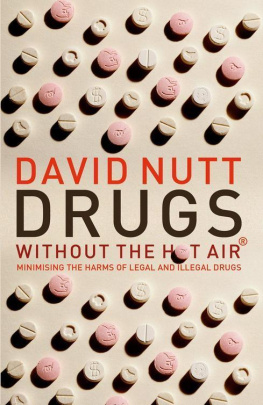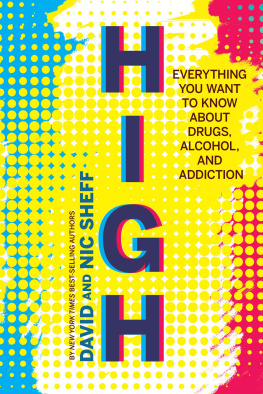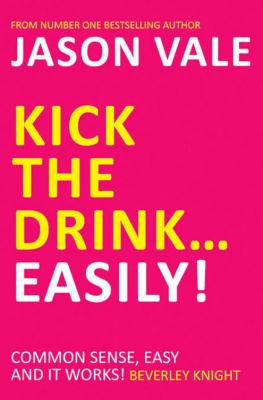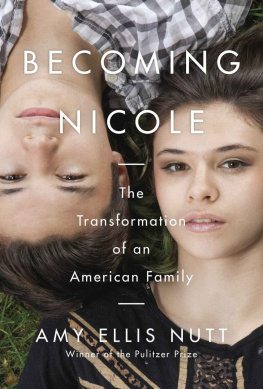David Nutt - Drink? : the new science of alcohol + your health
Here you can read online David Nutt - Drink? : the new science of alcohol + your health full text of the book (entire story) in english for free. Download pdf and epub, get meaning, cover and reviews about this ebook. year: 2020, genre: Religion. Description of the work, (preface) as well as reviews are available. Best literature library LitArk.com created for fans of good reading and offers a wide selection of genres:
Romance novel
Science fiction
Adventure
Detective
Science
History
Home and family
Prose
Art
Politics
Computer
Non-fiction
Religion
Business
Children
Humor
Choose a favorite category and find really read worthwhile books. Enjoy immersion in the world of imagination, feel the emotions of the characters or learn something new for yourself, make an fascinating discovery.
- Book:Drink? : the new science of alcohol + your health
- Author:
- Genre:
- Year:2020
- Rating:3 / 5
- Favourites:Add to favourites
- Your mark:
- 60
- 1
- 2
- 3
- 4
- 5
Drink? : the new science of alcohol + your health: summary, description and annotation
We offer to read an annotation, description, summary or preface (depends on what the author of the book "Drink? : the new science of alcohol + your health" wrote himself). If you haven't found the necessary information about the book — write in the comments, we will try to find it.
Drink? : the new science of alcohol + your health — read online for free the complete book (whole text) full work
Below is the text of the book, divided by pages. System saving the place of the last page read, allows you to conveniently read the book "Drink? : the new science of alcohol + your health" online for free, without having to search again every time where you left off. Put a bookmark, and you can go to the page where you finished reading at any time.
Font size:
Interval:
Bookmark:
DAVID NUTT
MBBChir (Cambridge) DM (Oxford), FRCP, FRCPsych, FMedSci, hon DLaws (Bath)
David Nutt is a psychiatrist and the Edmund J. Safra Professor of Neuropsychopharmacology in the Division of Brain Science, Dept of Medicine, Hammersmith Hospital, Imperial College London. His research area is psychopharmacology the study of the effects of drugs on the brain, from the perspectives of both how drug treatments in psychiatry and neurology work, and why people use and become addicted to some drugs such as alcohol. To study the effects of drugs in the brain he uses state of the art techniques such as brain imaging with PET and fMRI plus EEG and MEG. This research output has led to over 500 original research papers outs him in the top 0.1% of researchers in the world. He has also published a similar number of reviews and books chapters, eight government reports on drugs and 35 books, including one for the general public, Drugs: without the hot air, that won the Transmission Prize in 2014.
He was previously President of the European Brain Council, the British Association of Psychopharmacology, the British Neuroscience Association and the European College of Neuropsychopharmacology. He is currently Founding Chair of DrugScience.org.uk a charity that researches and tells the truth about all drugs, legal and illegal, free from political or other interference. He also currently holds visiting Professorships at the Open University and University of Maastricht.
David broadcasts widely to the general public both on radio and television. In 2010 The Times Eureka science magazine voted him one of the 100 most important figures in British Science, and the only psychiatrist in the list. In 2013 he was awarded the John Maddox Prize from Nature/Sense about Science for standing up for science and in 2017 a Doctor of Laws hon causa from the University of Bath.
en.wikipedia.org/wiki/David_Nutt
www.sciencemag.org/content/343/6170/478.full
www1.imperial.ac.uk/departmentofmedicine/divisions/brainsciences/psychopharmacology
DRINK?
The New Science of Alcohol and Your Health
Professor David Nutt

www.yellowkitebooks.co.uk
This book contains research findings and the opinions of the author.
It is not a substitute for medical advice from your health professional
and the author/publisher has no liability in this respect.
First published in Great Britain in 2020 by Yellow Kite
An imprint of Hodder & Stoughton
An Hachette UK company
Copyright Professor David Nutt 2020
The right of David Nutt to be identified as the Author of the
Work has been asserted by him in accordance with
the Copyright, Designs and Patents Act 1988.
Co-author: Brigid Moss
Cover design and Illustration by Emily Langford Hodder & Stoughton
Figures 2019 Cali Mackrill at Malik & Mack
All rights reserved. No part of this publication may be reproduced,
stored in a retrieval system, or transmitted, in any form or by any
means without the prior written permission of the publisher, nor be
otherwise circulated in any form of binding or cover other than that
in which it is published and without a similar condition being
imposed on the subsequent purchaser.
A CIP catalogue record for this title is available from the British Library
eBook ISBN 978 1 529 39472 6
Hodder & Stoughton Ltd
Carmelite House
50 Victoria Embankment
London EC4Y 0DZ
www.yellowkitebooks.co.uk
Contents
Preface
Most people know me as the UK government chief drugs advisor who was sacked in 2009 for saying government drugs policy wasnt evidence-based. But Im also a doctor and all my professional life I, like all doctors, have been confronted with the challenge of alcohol in our patients and in our colleagues.
The impact of alcohol on health is profound. Up to half of all people in beds in orthopaedic wards are there because of alcohol-related injury and at weekends the A&E departments of our hospitals are filled with people who are drunk. Alcohol and medicine are inextricably entwined in the same way as money and banking.
The real reason for my sacking, I believe, was that I had the temerity to say on primetime radio that alcohol was the most harmful drug in the UK. At that time alcohol wasnt even allowed to be considered a drug by the UK Advisory Council on the Misuse of Drugs the ACMD despite every scientist in the country knowing that it most certainly was a drug.
The evidence on which I based my statement was the most sophisticated and detailed analysis of drug harms ever conducted. Since then, similar studies have been carried out in Europe and Australia, each coming to the same conclusion: that alcohol is the most harmful drug in their societies, too.
The main reason why alcohol scores at the top of the harm scale is that so many of us like to drink it. Typically, in first world western countries alcohol is consumed by over 80 per cent of all adults. Of that 80 per cent only about one-fifth get into problems with it. But there are so many of these people that their alcohol problems have a massive impact on the rest of us, especially their families and friends. Alcohol is linked to a lot of violence both within and outside of the family, road traffic accidents, loss of work and many illnesses. Policing drunkenness in the UK costs over 6 billion a year and the health costs are over 3 billion.
Yet most of us continue to drink, and most dont get into serious difficulties with alcohol. This tells us that there are different biological and social factors that impact our relationship with alcohol. I believe that understanding these can help each of us, and our governments, make more rational and health-promoting decisions about how we all deal with alcohol. This book attempts to do this in a language every drinker can easily understand.
At a personal level, alcohol has been something I have been studying over my 40 years of medical research. For two years, in the late 1980s, I ran the inpatient research ward at the National Institute on Alcohol Abuse and Alcoholism (NIAAA) in the National Institutes of Health (NIH) in Maryland, USA. Since then, back in the UK, I have continued to study the brain basis of alcohol enjoyment and problems, along with treating patients with alcohol problems.
Yet also, with one of my daughters, I own a wine bar in Ealing, London. My life encapsulates the good and bad of alcohol and pulls together my knowledge, experiences and ideas in a way that I hope will explain why such a simple molecule as alcohol can give so much pleasure and pain at the same time.
Professor David Nutt is Professor of Neuropsychopharmacology at Imperial College London, Chair of DrugScience (drugscience.org.uk) and a former chair of the Advisory Council on the Misuse of Drugs.
Introduction
It was my first day at Cambridge, and somehow all of us first-year medical students in the same college found each other. Nine of us went to the pub around the corner.
We settled in for the evening. It was a typical 1960s city pub: small sticky tables, even stickier carpet, with a smoky atmosphere that had given a yellow veneer to the walls and ceiling. I wasnt a big drinker, but I had, I think, three pints of the local Greene King beer. Most of the others drank maybe four or five, which seemed a heck of a lot to me. At 10.30 p.m., the pub closed. Someone said they had a few bottles of wine back in their room, so we went back to the common room and hung around drinking them.
The mood was pretty loud and raucous, a bunch of green eighteen-year-olds having a laugh. But then, one of the guys started to cry. Not quietly but very loudly, wailing and weeping. It was an enormous outpouring of negative emotion so intense that I thought he was going to kill himself. I asked a friend whod been at school with him, should we call an ambulance? But he said, No, dont worry, he always does this. He wont even remember it in the morning.
Next pageFont size:
Interval:
Bookmark:
Similar books «Drink? : the new science of alcohol + your health»
Look at similar books to Drink? : the new science of alcohol + your health. We have selected literature similar in name and meaning in the hope of providing readers with more options to find new, interesting, not yet read works.
Discussion, reviews of the book Drink? : the new science of alcohol + your health and just readers' own opinions. Leave your comments, write what you think about the work, its meaning or the main characters. Specify what exactly you liked and what you didn't like, and why you think so.

